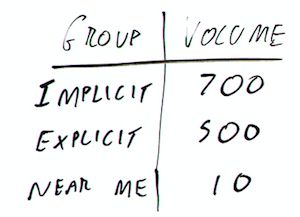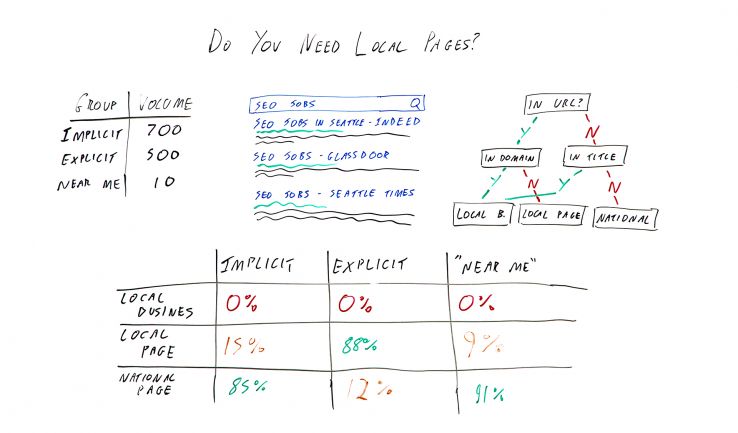News Courtesy of Moz.com:
Categorize your keywords as implicit, explicit, or near me and log their search volumes
We might have "SEO jobs" as our core head term. We then want to figure out what the implicit, explicit, and near me versions of that keyword are and what the different volumes are. In this case, the implicit version is probably just "SEO jobs." If you search for "SEO jobs" now, like if you open a new tab in your browser, you're probably going to find that a lot of local orientated results appear because that is an implicitly local term and actually an awful lot of terms are using local data to affect rankings now, which does affect how you should consider your rank tracking, but we'll get on to that later.

SEO jobs, maybe SEO vacancies, that kind of thing, those are all going to be going into your implicitly local terms bucket. The next bucket is your explicitly local terms. That's going to be things like SEO jobs in Seattle, SEO jobs in London, and so on. You're never going to get a complete coverage of different locations. Try to keep it simple.
You're just trying to get a rough idea here. Lastly you've got your near me or nearby terms, and it turns out that for SEO jobs not many people search SEO jobs near me or SEO jobs nearby. This is also going to vary a lot by vertical. I would imagine that if you're in food delivery or something like that, then that would be huge.
Excellent advice from the Moz team as usual. Most of my clients are service area based businesses. So it makes sense to build local targeted pages. Building content-rich geo-targeted or city pages as they’re called is a great way to drive traffic in that specific region. However, as Google has made many significant advances, searchers have come to realize that they might not need to add the location in their queries. 5 or 10 years ago it wasn’t uncommon to make a search such as “Drain Repair Atlanta”. These days, there is more of an assumption that Google and other search engines will automatically fill in that location based on your IP address location.
Determining searcher intent is crucial in deciding whether it makes sense to target a term locally. I’m really not a fan of the “Near Me” suffix added to search queries. I’ve never used it personally, but then again, I’m not your average searcher. In the search volume graphic provided by Moz, you can see that for SEO Jobs not many people are adding “Near me” at the end. This makes sense given the nature of the industry. Now if you take a term such as “Plumber”, that search volume with “Near me” added will surely be much higher than 10. Usually, plumbers and other contractors are needed in an emergency situation. “Near me” indicates that the searcher is looking for a plumber who can come out quickly to fix their problem.
So in what instance would it make sense to NOT have a local target campaign or pages? I’d say businesses who focus on a national brand or audience. One of my clients manufactures circuit boards. It wouldn’t make sense for them to target “Circuit Boards New Jersey”. Most of their customers will probably place orders to be delivered to them directly. Applying this logic to your own business will make the process easy to decide if you should start focusing on local pages.



